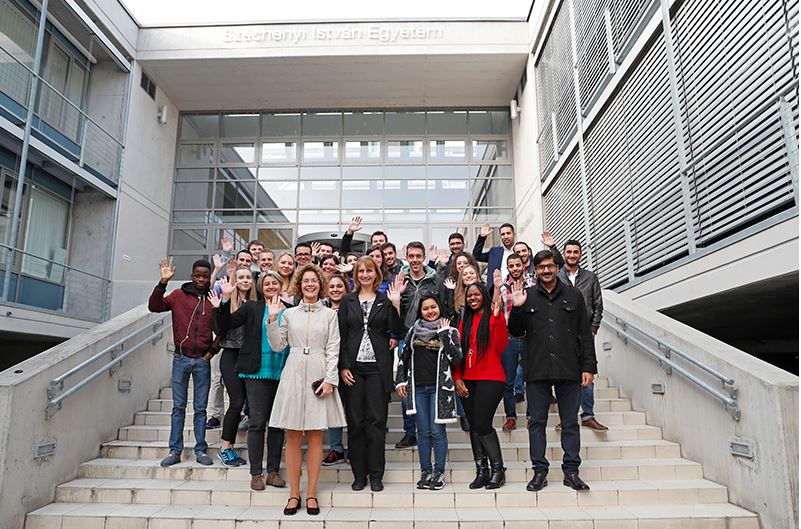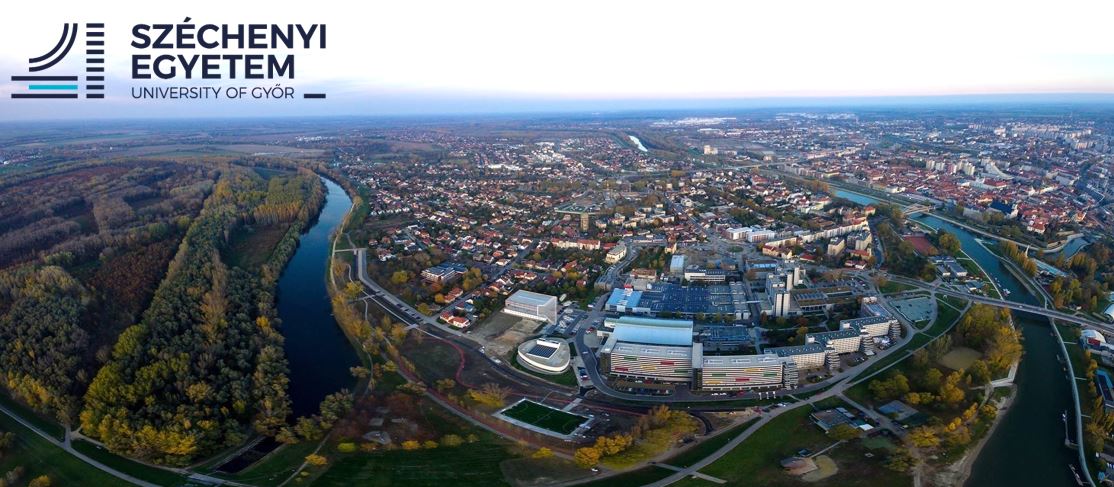STUDENTS FROM AFRICAN ASIA AND SOUTH AMERICA AT OUR UNIVERSITY

It's quite hard to miss the increasing number of foreign students when strolling around Győr. We decided to find out more about who they are and what they are doing here so we asked Eszter Lukács Phd., associate professor at Széchenyi István University, Head of the Centre of International Programmes.
We have had foreign students for ages at the university through the Erasmus Programme, but now they seem to have grown in number?
Yes, the Institutional Development Plan, closely linked to the Government’s Strategy on Higher Education, regards the internationalisation of training programmes as one of its top priorities. Opening our doors to the rest of the world is also a significant part of the new era represented by our Rector, Prof. Dr. Péter Földesi. Department heads and lecturers of our university courses taught in English are putting tremendous effort into developing the training programmes. We are learning new things and facing new challenges together in this process, supported by the high level infrastructural development that has taken place at the university in recent years.
68 students from 25 countries arrived at our university this autumn in the framework of the Stipendium Hungaricum scholarship programme, choosing Győr as the place for their studies. They come from different parts of the world from countries which Hungary has made inter-governmental agreements with: Angola, Kazakhstan, Azerbaijan, Moldova, Kenya, Ecuador, Jordan, Tunisia, Laos, Morocco, Ghana, Mexico, Pakistan, India, China, Vietnam and Iraq, the list being by no means exhaustive.
In this programme, the Ministry of Education provides a place and pays for the tuition of these foreign students who study on various BSc and MSc courses. They receive a monthly grant from the Ministry as well as funding for their accommodation and health insurance. Regarding the stay of foreign students the university has developed a daily working relationship with the Immigration Office as we have an obligation to report to them. Besides this programme we also have students through the Erasmus network from 12 countries all over Europe and additionally from Russia and Turkey. Currently there are 57 foreign students studying at our university.
What is the aim of the Stipendium Hungaricum Programme?
The Programme was launched by the government and is co-ordinated by the Tempus Public Foundation. Its educational purpose is to enhance internationalisation in the Hungarian higher education, to strengthen the international relations between the representatives of sciences, to increase the cultural diversity of higher education institutions and last but not least to popularise the competitive higher education in Győr and in Hungary. We hope that when these foreign students return to their home country they will be able to find employment using the knowledge and expertise acquired here and this in the long run can deepen the financial, economic and cultural relations between their countries and Hungary. So this programme is a kind of investment from the Hungarian side. Foreign student raise the prestige of the university, as the number of foreign students attending courses in English is a very important factor in the ranking of higher education institutions.
What do foreign students study in Győr?
At the moment we have four courses available in English: we offer a BSc programme in International Studies and MSc programmes in Marketing, Supply Chain Management and Infrastructural Engineering. The university also has a Management Doctoral Programme in English. Besides the above courses, the launch of nine more courses in English has already been decided on.
Why does it benefit the university to have foreign students?
The management of Széchenyi István University believes that it is of utmost importance that the university finds its position in a true market environment as well. Presently there is great demand from industry for our research and development achievements and we would like reflect this demand in our courses as well. We rely upon fee-paying students who come here and study on our English language programmes. Prof. Dr. László Komlósi representing the Rector in International Issues, supports our work by promoting the courses abroad through his international contacts and the university also benefits from his expertise as the former Vice Rector.
How long can these students stay?
The length of their stay varies, some stay for a shorter period, perhaps a couple of months but we also have students who have come here for a full university course. This mainly depends on the programme they arrive on.
Since you spend most of your day together with foreign students you must know the reason why they chose Győr?
I hope they chose Győr and this university because of our high quality courses. Student arriving here are aware of the region’s development and the presence of AUDI. This direct educational and research contact with industry is significant.
Do you think these students are interested in Hungary?
I believe that the fact that they are here proves their openness. 53 students signed up for the subject “Hungarian language and culture”.
In your opinion how well can these students adapt to life here?
I believe the foreign students feel at home here. With the help of the Erasmus Student Network and the Student’s Union a mentoring network has been set up on a voluntary basis. This means that each foreign student has two mentors, a personal mentor who is a fellow student and a professional mentor, usually a representative from their faculty. My colleagues at the Centre of International Programmes are also doing everything to help these students. We have regular programmes specially organised for foreign students such as programmes to explore the city and we also advertise programmes for foreign students on social media websites and closed student groups.











